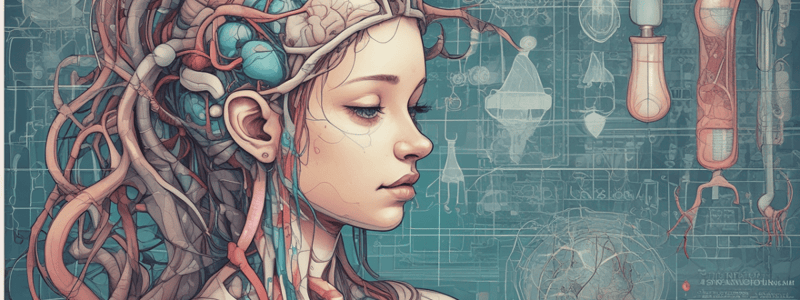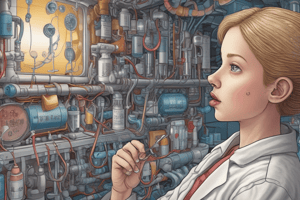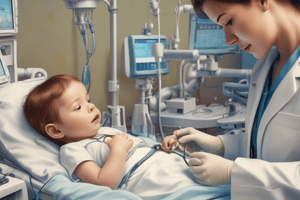Podcast
Questions and Answers
What is a significant consequence of the immature blood-brain barrier (BBB) in an infant?
What is a significant consequence of the immature blood-brain barrier (BBB) in an infant?
- It reduces the risk of anesthetic toxicity.
- It prevents the crossing of anesthetic drugs into the brain.
- Easier crossing of drugs allows for higher concentrations in the brain and quicker onset (correct)
- It leads to a slower onset of anesthetic drugs in the brain.
Why do infants have a greater sensitivity to changes in cerebral blood volume?
Why do infants have a greater sensitivity to changes in cerebral blood volume?
- Due to their mature blood-brain barrier.
- Due to their increased cardiac output.
- Due to their underdeveloped cerebral autoregulation. (correct)
- Due to their developed cerebral autoregulation.
What is the primary reason for the open cranial sutures in an infant? (select 2)
What is the primary reason for the open cranial sutures in an infant? (select 2)
- To allow for cerebral blood volume changes due to undeveloped autoregulation. (correct)
- To reduce the risk of intracranial hypertension.
- To facilitate the rapid growth of the brain in utero. (correct)
- To improve the development of cerebral autoregulation.
What information can an anesthesia provider gather from the assessment of an infant's fontanelles?
What information can an anesthesia provider gather from the assessment of an infant's fontanelles?
Why do infants have a fixed stroke volume (SV)?
Why do infants have a fixed stroke volume (SV)?
How do infants increase their cardiac output?
How do infants increase their cardiac output?
What is a consequence of an infant's blunted response to catecholamines and decreased catecholamine stores?
What is a consequence of an infant's blunted response to catecholamines and decreased catecholamine stores?
What is the term for the areas where open sutures converge in an infant?
What is the term for the areas where open sutures converge in an infant?
What is a potential reason why catecholamines may be less effective in treating hypotension in infants?
What is a potential reason why catecholamines may be less effective in treating hypotension in infants?
Why is volume expansion important in treating hypotensive infants?
Why is volume expansion important in treating hypotensive infants?
What is an advantage of using epinephrine over atropine in treating hypotension in infants?
What is an advantage of using epinephrine over atropine in treating hypotension in infants?
What is a consideration when planning for airway management and intubation of an infant?
What is a consideration when planning for airway management and intubation of an infant?
Why is a shoulder roll useful during intubation of an infant?
Why is a shoulder roll useful during intubation of an infant?
Why is it wise to use an uncuffed ETT when intubating an infant?
Why is it wise to use an uncuffed ETT when intubating an infant?
What is the primary reason why neonatal patients are more dependent on heart rate for cardiac output?
What is the primary reason why neonatal patients are more dependent on heart rate for cardiac output?
What is the primary reason why neonatal patients are obligate nose breathers?
What is the primary reason why neonatal patients are obligate nose breathers?
What is the primary reason why neonatal patients have a higher respiratory rate?
What is the primary reason why neonatal patients have a higher respiratory rate?
What is the significance of type II pneumocytes and surfactant in neonatal patients?
What is the significance of type II pneumocytes and surfactant in neonatal patients?
What is the main reason why the cricoid cartilage is a significant concern in pediatric airway management?
What is the main reason why the cricoid cartilage is a significant concern in pediatric airway management?
What is the primary mechanism by which providers can compensate for the decreased functional residual capacity (FRC) of pediatric pts?
What is the primary mechanism by which providers can compensate for the decreased functional residual capacity (FRC) of pediatric pts?
What is the main concern regarding pain management in neonates?
What is the main concern regarding pain management in neonates?
What is the primary reason for the increased volume of distribution (Vd) of certain drugs in neonates?
What is the primary reason for the increased volume of distribution (Vd) of certain drugs in neonates?
What is the primary stimulus for the Hering-Breuer reflex?
What is the primary stimulus for the Hering-Breuer reflex?
What is the consequence of the drastic decrease in glycogen stores in the first 3 weeks of life in neonates?
What is the consequence of the drastic decrease in glycogen stores in the first 3 weeks of life in neonates?
At what age is normal kidney function typically present in neonates?
At what age is normal kidney function typically present in neonates?
What is a characteristic of the pediatric nervous system?
What is a characteristic of the pediatric nervous system?
What is the primary mechanism of thermogenesis in neonates?
What is the primary mechanism of thermogenesis in neonates?
What is the primary factor limiting exhalation in pediatric patients?
What is the primary factor limiting exhalation in pediatric patients?
When do anterior and posterior fontanelles typically close?
When do anterior and posterior fontanelles typically close?
Why is epinephrine preferred over atropine in pediatric anesthesia?
Why is epinephrine preferred over atropine in pediatric anesthesia?
What is different between the cardiovascular system of adults and neonates?
What is different between the cardiovascular system of adults and neonates?
Blood volume in mL/kg
Blood volume in mL/kg
What is the cause of physiologic anemia of infancy, which peaks at 3-4 months of age?
What is the cause of physiologic anemia of infancy, which peaks at 3-4 months of age?
What is the significance of fetal hemoglobin in cardiovascular function?
What is the significance of fetal hemoglobin in cardiovascular function?
What is unique about the larynx of neonates?
What is unique about the larynx of neonates?
Why is the risk of mainstem intubation higher in pediatrics?
Why is the risk of mainstem intubation higher in pediatrics?
In pediatrics, the subglottic is __ shaped
In pediatrics, the subglottic is __ shaped
In pediatrics, the vocal cords have an ___ slant
In pediatrics, the vocal cords have an ___ slant
What anatomic features result in decreased FRC in pediatrics? (select 2)
What anatomic features result in decreased FRC in pediatrics? (select 2)
What is the response to decreased PaO2 in pediatrics?
What is the response to decreased PaO2 in pediatrics?
What reflex causes periodic breathing and pauses lasting up to 10 seconds?
What reflex causes periodic breathing and pauses lasting up to 10 seconds?
Why are depolarizing neuromuscular blockers (NMB) avoided in neonates?
Why are depolarizing neuromuscular blockers (NMB) avoided in neonates?
What is the difference in the location of the conus medullaris and dural sac between adults and pediatric patients?
What is the difference in the location of the conus medullaris and dural sac between adults and pediatric patients?
What is the implication of decreased protein binding in pediatrics?
What is the implication of decreased protein binding in pediatrics?
What is the expected effect of drugs with a high volume of distribution?
What is the expected effect of drugs with a high volume of distribution?
What factors contribute to a neonate's inability to regulate body temperature?
What factors contribute to a neonate's inability to regulate body temperature?
What factors influence the rapid induction and recovery from anesthetics in neonates?
What factors influence the rapid induction and recovery from anesthetics in neonates?
What is unique about the volume of distribution (Vd) for water-soluble drugs in pediatrics?
What is unique about the volume of distribution (Vd) for water-soluble drugs in pediatrics?
What is an expected finding in a patient less than 6 months old?
What is an expected finding in a patient less than 6 months old?
Birth weight
Birth weight
SGA < 10%
SGA < 10%
What are the metabolic contributors of apnea in the premature infant?
What are the metabolic contributors of apnea in the premature infant?
What type of volatile anesthetics should be used to prevent apnea of prematurity?
What type of volatile anesthetics should be used to prevent apnea of prematurity?
What is the result of an undeveloped respiratory system in premature infants?
What is the result of an undeveloped respiratory system in premature infants?
In pediatric patients within 2-4 weeks of a URI, which of the following complications are more likely to occur?
In pediatric patients within 2-4 weeks of a URI, which of the following complications are more likely to occur?
When a pediatric patient presents with a URI, what can you do to prevent adverse reactions?
When a pediatric patient presents with a URI, what can you do to prevent adverse reactions?
What is a simple way to avoid bronchospasm prior to induction?
What is a simple way to avoid bronchospasm prior to induction?
What factors result in a higher risk of aspiration for children?
What factors result in a higher risk of aspiration for children?
What is the premedication of choice in pediatrics for anxiolysis?
What is the premedication of choice in pediatrics for anxiolysis?
At what cervical level are the vocal cords located in pediatrics?
At what cervical level are the vocal cords located in pediatrics?
What is the relationship between age and closing volume in infants?
What is the relationship between age and closing volume in infants?
How does closing volume affect tidal volume?
How does closing volume affect tidal volume?
What is the normal tidal volume and respiratory rate of infants?
What is the normal tidal volume and respiratory rate of infants?
What will increase peripheral vascular resistance in pediatrics?
What will increase peripheral vascular resistance in pediatrics?
What will decrease pulmonary vascular resistance (PVR) in pediatrics?
What will decrease pulmonary vascular resistance (PVR) in pediatrics?
What external feature is associated with mandibular hypoplasia?
What external feature is associated with mandibular hypoplasia?
Why are NPAs typically avoided in pediatrics?
Why are NPAs typically avoided in pediatrics?
What can result from an air leak not being present?
What can result from an air leak not being present?
What are the preferred ventilator settings for pediatrics?
What are the preferred ventilator settings for pediatrics?
What are the advantages of awake extubation?
What are the advantages of awake extubation?
What are the advantages of deep extubation in infants? (Select 2)
What are the advantages of deep extubation in infants? (Select 2)
What is the treatment for laryngospasm?
What is the treatment for laryngospasm?
What is the presenting symptom of choanal atresia?
What is the presenting symptom of choanal atresia?
Children with Down Syndrome frequently need _____than anticipated ETTs
Children with Down Syndrome frequently need _____than anticipated ETTs
ETT cuffed Age/4+3.5
ETT uncuffed Age/4+4
ETT cuffed Age/4+3.5 ETT uncuffed Age/4+4
Flashcards are hidden until you start studying
Study Notes
Anesthesia in Infants
- The blood-brain barrier (BBB) is immature in infants, allowing drugs to cross more easily and resulting in higher concentrations of drugs in the brain, leading to a faster onset and higher levels of the drug.
- This immaturity affects the anesthetic plan for infants, requiring consideration of the potential for higher drug concentrations in the brain.
Cerebral Blood Volume and ICP
- Infants have an underdeveloped central nervous system (CNS) and lack cerebral autoregulation, making them sensitive to changes in cerebral blood volume.
- An increase in cerebral blood volume results in a rapid rise in intracranial pressure (ICP) in infants.
Cranial Sutures and Fontanelles
- The cranial sutures are open in infants to allow for rapid growth and to accommodate increased cerebral blood volume without increasing ICP.
- The anterior fontanelle closes by 2 years, and the posterior fontanelle closes by 4 months.
- Fontanelles can be used to assess hydration status and increased ICP in infants; sunken fontanelles indicate dehydration, and bulging fontanelles indicate increased ICP.
Cardiovascular System
- Infants have a fixed stroke volume (SV) due to immature cardiac contractile elements, which are dependent on free ionized calcium for contractility.
- Infants increase their cardiac output by increasing their heart rate (HR).
- Infants have blunted responses to catecholamines and decreased catecholamine stores, which affects the treatment of hypotension.
- When treating hypotension, volume expansion is important, and calcium may be effective in treating infants not responsive to fluid bolus.
- Epinephrine is a better choice than atropine due to its inotropic and chronotropic properties.
Airway Management
- The larynx of an infant is higher and more superior, situated around the C3-4.
- The epiglottis is stiff and floppy, and the tongue is large.
- These anatomical features make airway management and intubation more challenging in infants.
- It is easier to obstruct the airway of infants with minimal pressure on the submental space.
- Placing an infant in the sniffing position worsens the laryngoscopic view due to the position of the larynx.
- A shoulder roll is better used to align the laryngoscopic axes.
- An uncuffed endotracheal tube (ETT) may be preferred due to the risk of increased airway resistance and tracheal damage from inflated cuffs.
Pediatric Patients
- Pediatric patients have increased minimum alveolar concentration (MAC), rapid induction and recovery.
- They have larger volumes of distribution for water-soluble drugs.
Neonatal Cardiovascular Characteristics
- Immature myocardium and noncompliant left ventricle result in increased afterload and reduced cardiac output.
- Fixed stroke volume and HR-dependent cardiac output.
- Faster HR.
- Epinephrine is better than atropine for bradycardia due to blunted responses to exogenous catecholamines.
- Ensure adequate volume and avoid hypotension.
- Underdeveloped baroreceptor reflex and parasympathetic innervation.
- Fetal hemoglobin is predominant, with higher affinity for oxygen and physiologic anemia of infancy.
Neonatal Respiratory Characteristics
- Type II pneumocytes and surfactant develop at 22-26 weeks and peak at 35-36 weeks.
- Lack of surfactant leads to stiff, noncompliant lungs, severe atelectasis, V/Q mismatch, hypoxia, and hypercarbia.
- Infant's metabolic rate and oxygen consumption are twice that of adults.
- Increased resistance to airflow.
- Obligate nose breathers.
- Respiratory rate (RR) is 37 in healthy newborn babies, with smaller babies having to work harder to breathe.
Vent Settings
- Low flow trigger to avoid exhaustion.
- Avoid using volume control (VC) mode to prevent lung damage.
Neonatal Airway Anatomy
- Large occiput and large tongue.
- Short, small, stiff epiglottis.
- Larynx is small, more cephalad, and anterior, pointing towards the nasopharynx.
- Subglottic region is smaller than the glottis opening.
- Cricoid cartilage is the narrowest part of the airway.
Pediatric Breathing Mechanics
- Decreased functional residual capacity (FRC) due to underdeveloped muscles and skeletal structure.
- Horizontal ribs resulting in minimal assistance with chest expansion for inspiration.
- Exhalation limited by adductor muscles of the larynx.
- Flat diaphragm, like COPD patients, requiring more effort to breathe.
- Diaphragm composed mainly of fast-fatiguing fibers.
- Must assess for increased respiratory effort and intervene to maintain oxygenation and prevent fatigue.
Overcoming Decreased FRC
- Positive pressure can help overcome decreased FRC.
Breathing Control
- Breathing controlled by PaO2, PaCo2, and pH.
- Initial response to decreased PaO2 is an increase in ventilatory response, followed by a decrease in ventilatory response due to impaired ability to compensate and rapid fatigue.
- Hering-Breuer reflex can cause pauses in breathing up to 10 seconds.
Pediatric Nervous System
- CNS development is incomplete at birth and continues until the end of the first year of life.
- Changes in cerebral blood flow, cerebral blood volume, and ICP greatly affect each other.
- Autoregulation is easily impaired, and caregivers should monitor cerebral perfusion pressure (CPP).
- Immature blood-brain barrier and neuromuscular junction.
- CNS is vulnerable to trauma, hypoxia, hypoglycemia, and ischemia.
Pain
- Lack of cerebral vascular autoregulation makes pain management challenging in neonates.
- Recommended to limit infusions and doses of analgesics and use multimodal methods.
Liver of Neonates
- Immature hepatic biotransformation, impaired metabolism, and decreased protein binding.
- Increases in lipid solubility increase the volume of distribution, leading to longer duration of action.
- Highly protein-bound and highly lipid-soluble drugs may leave more drug to target tissues specifically.
Kidneys of Neonates
- Normal kidney function is not present until 6 months, and kidney function may not be fully mature until age 2.
Thermoregulation
- Neonates lack the ability to regulate body temperature due to large surface area, lack of subcutaneous tissue, and inability to shiver.
- Brown fat metabolism allows for non-shivering thermogenesis.
- Hypothermia can be caused by various factors, including environmental temperature, cold surfaces, and inadequate clothing.
Studying That Suits You
Use AI to generate personalized quizzes and flashcards to suit your learning preferences.




